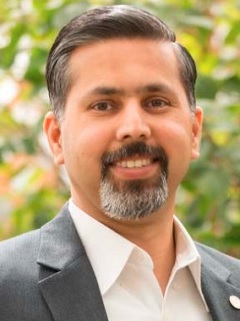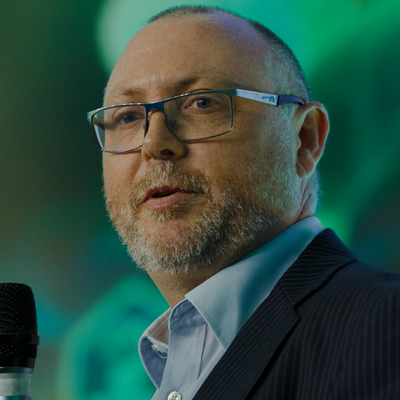Session Details
The advent of precision agriculture that occurred in the USA about three decades ago involved application of advanced and innovative technologies. Precision agriculture in the US and other advanced countries continued in that direction and today it is more sophisticated and complex than before. Interestingly, the concept of Precision Agriculture is relatively simple and does not mandate utilization of advanced technologies to practice precision agriculture. For example, it may take a suite of auto-pilots or high resolution guidance system on a 1000 hectare farm in the USA to practice precision agriculture or it may take a group of skilled labors/farmers to practice precision planting on a 0.5 hectare field in a small farm in India. While the scale of farming is certainly contrasting in the two scenarios, however, both scenarios involved and implemented the right techniques to identify and manage spatial and temporal variability, and hence would fall under precision agricultural practices.
There are opportunities for practicing precision agricultural techniques around the globe. The form of precision practices may be different from one place to another place, depending upon the creative mindset of farmers, practitioners, scientists and consultants local to the area of interest. This paper will present the broad concept of precision agriculture with several examples of precision agricultural practices from several countries, where farmers and practitioners have overcome the challenges and converted them into opportunities by harnessing the global information and developing local precision techniques suitable for their region, operation and resources.

This paper will present a synthesis of activities performed in a collaborative UK-China project (PAFiC - 2015-2019) aimed at achieving a better understanding of the translation of precision agriculture (PA) technologies into small farms in China. The intent is to outline the farmer-focused approach that was used in the PAFiC project and the tools developed to understand PA adoption trends in China. Finally, we consider the potential implications of the outputs from PAFiC for promoting and accelerating PA adoption in Africa.
PAFiCwas the first large scale project within the UK-China Agri-Tech framework to address the issue of translation and adoption of PA in China, considering the needs, priorities and preferences of end-users (farmers) in the in the research and development process, to ensure an increased and more equitable adoption of PA technologies. To achieve this, a mixed-methods approach was taken using both qualitative interviews and a quantitative survey to explore farmers perceptions, and current and anticipated use of PA technologies.
A first round of interviews with 34 farmers and 10 experts revealed PA technologies were considered inaccessible and unsuitable for smaller Chinese farms. These findings, and a subsequent review of the literature led to the construction of a general framework that combines farmer priorities and preferences and requirements for PA technology design, including factors needed to facilitate their adoption. The framework was designed to identify issues associated with socio-economic and cultural barriers, and context specific factors (e.g. the farm scale) that are restricting PA adoption, as well as drivers and benefits of PA adoption.
This informed a second round of in-depth interviews with 27 small-holder farmers and a new survey conducted face-to-face with 456 growers across three provinces in China. Findings revealed an openness to PA technologies and their use on farm, although farmers actual willingness to adopt varied. Also, how innovative individual growers perceived themselves to be did not often match up with reality, with many actually being less innovative than they thought. Several barriers to adoption were identified.
To more systematically explore these findings, an integrated model of “Adapted Unified Theory of Acceptance and Usage of Technology (AUT2)” was proposed to explain individual farmer’s future intentions to adopt PA technologies. The modelling results demonstrated that the ‘farmer need-technology fit’, perceived benefits and risks of PA technologies, and facilitating adoption conditions all have significant impacts on farmers’ intention to adopt PA technologies. Overall, the facilitating conditions of access to knowledge, resources and consultant services, were found to play the biggest role in improving Chinese farmers’ willingness to adopt PA technologies. This corresponds to the identified barriers in the in-depth interviews.
Critically, the generic framework and the AUT2 model is transferable and may have a key role to play in promoting PA technologies, and the correct type of technologies, in African systems. The paper will conclude with a discussion on the implications and possible uses of the framework and model by African researchers involved with agri-tech applications in Africa.

Field level soil data has been the foundation of agronomic advisory, but traditional methods involving on-farm sampling are too expensive for a large proportion of African smallholders. Building on the work of the African Soil Information Service (AfSIS), Innovative Solutions for Decision Agriculture (iSDA) and partners have created an agronomic soil database which covers the entire African continent at a spatial resolution of 30 m. “iSDAsoil” combines remote sensing data and other geospatial information with carefully stratified point samples subjected to spectral analysis and traditional wet chemistry reference analysis. State of the art machine learning techniques were used to create digital maps of 17 agronomically important soil properties at 3 depths, including estimates of uncertainty.
iSDAsoil data will be available through Open and FAIR data access principles so that it can empower researchers, businesses, governments and others to make data-informed decisions for improving the productivity of African agriculture. The data platform is designed to encourage sharing and we hope that the owners of other soil and agronomic data, in industry and academia, will share their datasets to help create ever more accurate maps. The mapping infrastructure has been designed to allow fast updates for regular addition of new data.
These data will also form the open core of iSDA’s business-to-business data analytics platform, that will deliver products and services supporting low-cost agronomic advisory provision for millions of smallholders across Africa. Together with its partners across Africa and elsewhere, iSDA is building site-specific fertilizer optimization and yield prediction tools based on the 30m soil map resource. These are being validated and refined through a network of on-farm trials in Ghana. Meanwhile, iSDA has established a pilot to test financially sustainable soil-scanner-based advisory in Kenya.
The design of our advisory systems is based on advanced decision science and value of information analysis, and leverages historical agronomic and economic data in combination with iSDAsoil to generate probabilistic, risk-based return-on-investment analyses. We are initially focusing on advisory for maize, rice, potato and coffee but will expand to cover all major crops of importance to smallholders in Africa. iSDA's unique focus is combining new low-cost technologies, rigorous on-farm science and viable last mile delivery business models.
iSDA’s newest project, currently in the planning phase, will provide access to our advisory via a public-private-partnership (PPP) model in East Africa, in combination with financial and insurance sector partners, commercial agribusiness and government programs. The provision of bundled services will create a win-win scenario with improved profitability for smallholders, and new markets for financial institutions. In particular, we want to foster a platform that can facilitate access to a range of inputs and services aligned with our agronomic advisory, including partnerships with agri-dealers (for seed and agrochemicals) and agri-service providers (such as mechanization, irrigation and market access). A major benefit of this model is that it builds on a digital distribution model already financed for other purposes.


This live discussion will consist of all the panelist on the PA for Smallholders session. Use the Q & A tools in the webinar program to pose questions to the speakers. A moderator will relay questions to the speakers.




